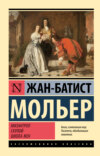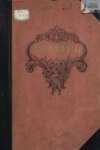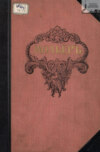Kitobni o'qish: «The Love-Tiff»
INTRODUCTORY NOTICE
The Love-tiff (Le Dépit-amoureux) is composed of two pieces joined together. The first and longest is a comparatively modest imitation of a very coarse and indecent Italian comedy, L'Interesse, by Signer Nicolo Secchi; its intrigue depends chiefly on the substitution of a female for a male child, a change which forms the groundwork of many plays and novels, and of which Shakespeare has also made use. The second and best part of the Love-tiff belongs to Molière alone, and is composed chiefly of the whole of the first act, the first six verses of the third scene, and the whole of the fourth scene of the second act; these, with a few alterations and a few. lines added, form, the comedy which the Théâtre Française plays at the present time. It was first represented at Béziers towards the end of 1656, when the States General of Languedoc were assembled in that town, and met with great success; a success which continued when it was played in Paris at the Théâtre du Petit-Bourbon in 1658. Why in some of the former English translations of Moliére the servant Gros-René is called "Gros-Renard" we are unable to understand, for both names are thoroughly French. Mr. Ozell, in his translation, gives him the unmistakably English, but not very euphonious name of "punch-gutted Ben, alias Renier," whilst Foote calls him "Hugh." The incidents of the Love-tiff are arranged artistically, though in the Spanish taste; the plot is too complicated, and the ending very unnatural. But the characters are well delineated, and fathers, lovers, mistresses, and servants all move about amidst a complication of errors from which there is no visible disentangling. The conversation between Valère and Ascanio in man's clothes, the mutual begging pardon of Albert and Polydore, the natural astonishment of Lucile, accused in the presence of her father, and the stratagem of Éraste to get the truth from his servants, are all described in a masterly manner, whilst the tiff between Éraste and Lucile, which gives the title to the piece, as well as their reconciliation, are considered among the best scenes of this play.
Nearly all actors in France who play either the valets or the soubrettes have attempted the parts of Gros-René and Marinette, and even the great tragédienne Madlle. Rachel ventured, on the 1st of July, 1844, to act Marinette, but not with much success.
Dryden has imitated, in the fourth act of An Evening's Love, a small part of the scene between Marinette and Éraste, the quarrelling scene between Lucile, Éraste, Marinette, and Gros-René, as well as in the third act of the same play, the scene between Albert and Metaphrastus. Vanbrugh has very closely followed Molière's play in the Mistake, but has laid the scene in Spain. This is the principal difference I can perceive. He has paraphased the French with a spirit and ease which a mere translation can hardly ever acquire. The epilogue to his play, written by M. Motteux, a Frenchman, whom the revocation of the Edict of Nantes brought into England, is filthy in the extreme. Mr. J. King has curtailed Vanbrugh's play into an interlude, in one act, called Lover's Quarrels, or Like Master Like Man.
Another imitator of Molière was Edward Ravenscroft, of whom Baker says in his Biographia Dramatica, that he was "a writer or compiler of plays, who lived in the reigns of Charles II. and his two successors." He was descended from the family of the Ravenscrofts, in Flintshire; a family, as he himself, in a dedication asserts, so ancient that when William the Conqueror came into England, one of his nobles married into it.
He was some time a member of the Middle Temple; but, looking on the dry study of the law as greatly beneath the attention of a man of genius, quitted it. He was an arrant plagiary. Dryden attacked one of his plays, The Citizen turned Gentleman, an imitation of Molière's Bourgeois-Gentilhomme, in the Prologue to The Assignation.
Ravenscroft wrote "The Wrangling Lovers, or the Invisible Mistress. Acted at the Duke's Theatre, 1677. London, Printed for William Crook, at the sign of the Green Dragon, without Temple-Bar, 1677." Though the plot was partly taken from a Spanish novel, the author has been inspired by Molière's Dépit amoureux. The scene is in Toledo: Éraste is called Don Diego de Stuniga, Valère Don Gusman de Haro, "a well-bred cavaliere," Lucile is Octavia de Pimentell, and Ascanio is Elvira; Gros-René's name is Sanco, "vallet to Gusman, a simple pleasant fellow," and Mascarille is Ordgano, "a cunning knave;" Marinette is called Beatrice and Frosine Isabella. The English play is rather too long. Don Gusman courts Elvira veiled, whilst in the French play Ascanio, her counterpart, is believed to be a young man. There is also a brother of Donna Elvira, Don Ruis de Moncade, who is a rival of Don Diego, whilst in le Dépit-amoureux. Valère is not the brother but the husband of Ascanio and the rival of Éraste (Don Diego) as well. The arrangement of the English comedy differs greatly from the French. Though the plot in both plays is nearly identical, yet the words and scenes in The Wrangling Lovers are totally different, and not so amusing. Mascarille and Gros-René are but faintly attempted; Marinette and Frosine only sketched in outline; and in the fifth act the ladies appear to have nothing else to do but to pop in and out of closets. The scenes of the French play between Albert and Metaphrastus (ii. 7); the very comical scene between Albert and Polydore (iii. 4) and the reconciliation scene between Lucile and Éraste (iv. 3), are also not rendered in the English comedy. There are very few scenes which can be compared with those of le Dépit amoureux.
DRAMATIS PERSONÆ
ÉRASTE, in love with Lucile.
ALBERT, father to Lucile.
[Footnote: This part was played by Moliére himself]
GROS-RENÉ, servant to Éraste.
VALÈRE, son to Polydore.
POLYDORE, father to Valère.
MASCARILLE, servant to Valère.
METAPHRASTUS, a pedant.
LA RAPIÉRE, a bully.
LUCILE, daughter to Albert.
ASCANIO, Albert's daughter, in man's clothes.
FROSINE, confidant to Ascanio.
MARINETTE, maid to Lucile.
ACT I
SCENE I. – ÉRASTE, GROS-RENÉ
ERAS. Shall I declare it to you? A certain secret anxiety never leaves my mind quite at rest. Yes, whatever remarks you make about my love, to tell you the truth, I am afraid of being deceived; or that you may be bribed in order to favour a rival; or, at least, that you may be imposed upon as well as myself.
GR. – RE. As for me, if you suspect me of any knavish trick, I will say, and I trust I give no offence to your honour's love, that you wound my honesty very unjustly, and that you show but small skill in physiognomy. People of my bulk are not accused, thank Heaven! of being either rogues or plotters. I scarcely need protest against the honour paid to us, but am straightforward in every thing.
[Footnote: Du Parc, the actor who played this part, was very stout; hence the allusion in the original, "et suis homme fort rond de toutes les manieres." I have, of course, used in the translation the word "straightforward" ironically, and with an eye to the rotundity of stomach of the actor. Molière was rather fond of making allusions in his plays to the infirmities or peculiarities of some of his actors. Thus, in the Miser (l'Avare) Act I, Scene 3, he alludes to the lameness of the actor Béjart, "Je ne me plais point a voir ce chien de boiteux-la." "I do not like to see that lame dog;" in the Citizen who apes the Nobleman (le Bourgeois gentilhomme), Act iii. sc. 9, he even gives a portrait of his wife.]
As for my being deceived that may be; there is a better foundation for that idea; nevertheless, I do not believe it can be easily done. I may be a fool, but I do not see yet why you vex yourself thus. Lucile, to my thinking, shows sufficient love for you; she sees you and talks to you, at all times; and Valère, after all, who is the cause of your fear, seems only to be allowed to approach her because she is compelled so to act.
ERAS. A lover is often buoyed up by false hope. He who is best received is not always the most beloved. The affection a woman displays is often but a veil to cover her passion for another. Valère has lately shown too much tranquillity for a slighted lover; and the joy or indifference he displays at those favours, which you suppose bestowed upon me, embitters continually their greatest charms, causes this grief, which you cannot understand, holds my happiness in suspense, and makes it difficult for me to trust completely anything Lucile says to me. I should feel delighted if I saw Valère animated by a little more jealousy; his anxiety and impatience would then reassure my heart. Do you as yourself think it possible for any one to see a rival caressed and be as satisfied as he is; if you do not believe it, tell me, I conjure you, if I have not a cause to be perplexed?
GR. – RE. Perhaps he has changed his inclination, upon finding that he sighed in vain.
ERAS. When love has been frequently repelled it frees itself, and wishes to flee from the object it was charmed with; nor does it break its chain so quietly as to be able to continue at peace. When once we have been fond of anyone who influenced our destiny we are never afterwards indifferent in her presence; if our dislike does not increase when we behold her our love is upon the point of returning again. Believe me, however much a passion may be extinguished, a little jealousy still dwells in our breast; no one can see, without feeling some pang, the heart he has lost possessed by another.
GR. – RE. For my part, I do not understand so much philosophy. I candidly believe what my eyes see, and am not such a mortal enemy to myself as to become melancholy without any cause. Why should I try to split hairs, and labour hard to find out reasons to be miserable? Shall I alarm myself about castles in the air? Let Lent come before we keep it! I think grief an uncomfortable thing; and, for my part, I never foster it without good and just cause. I might frequently find a hundred opportunities to become sad, but I do not want to see them. I run the same risk in love as you do; I share in your bad or good luck. The mistress cannot deceive you but the maid will do the same by me; yet I carefully avoid thinking about it. I like to believe people when they say "I love you." In order to be happy, I do not try to find out whether Mascarille tears the hair out of his head or not. Let Marinette allow herself to be kissed and caressed by Gros-René as much as he likes, and let my charming rival laugh at it like a fool, I will laugh too as much as I like, and follow his example; we shall then see who will laugh the heartiest.
[Footnote: In several editions of Molière we find, instead of Gros-René the name of Jodelet. The latest, and and if I might be permitted to say so, the most careful editor of our author, Mons. E. Despois, thinks that "Gros-René" ought to be mentioned here. The sense shows he is right.]
ERAS. That is like your talk.
GR. – RE. But here she comes.
SCENE II. – MARINETTE, ÉRASTE, GROS-RENÉ
GR. – RE. Hist! Marinette.
MAR. Hallo! what are you doing there?
GR. – RE. Faith! do you ask? We were just talking about you.
MAR. Are you there too, sir? Upon my word you have made me trot about like a flunkey for this hour past.
ERAS. How so?
MAR. I have walked ten miles to look for you, and give you my word that…
ERAS. What?
MAR. That you were neither at church, in the fashionable walk, at home, nor in the market-place.
GR. – RE. You may swear to that.
ERAS. But pray, tell me who sent you?
MAR. One, in good truth, who bears you no great ill-will; in a word, my mistress.
ERAS. Ah! dear Marinette, do your words really express what she feels? Do not hide some ominous secret from me. I should not dislike you for this. For Heaven's sake tell me if your charming mistress does not merely pretend to love me?
MAR. Ha! ha! ha! What has put that funny notion into your head? Does she not sufficiently show her inclination? What further security does your love demand? What does it require?
GR. – RE. Unless Valère hangs himself, or some such trifle, he will not be reassured.
MAR. How so?
GR. – RE. He is so very jealous.
MAR. Of Valère? Ha! a pretty fancy indeed! It could only be hatched in your brain. I thought you a man of sense, and until now had a good opinion of your intellect; but I see I was very much deceived. Have you also got a touch of this distemper in your head?
GR. – RE. I jealous? Heaven forbid! and keep me from being so silly as to go and make myself lean with any such grief. Your heart guarantees your fidelity; besides, I have too good an opinion of myself to believe that any other could please you after me. Where the deuce could you find any one equal to me?
MAR. You really are right; that is as it should be. A jealous man should never show his suspicions! All that he gains by it is to do himself harm, and in this manner furthers the designs of his rival. Your distrust often is the cause that a mistress pays attention to a man, before whose merits your own have paled. I know a certain person who, were it not for the preposterous jealousy of a rival, had never been so happy as he now is. But, in any case, to show suspicion in love is acting a foolish part, and after all is to make one's-self miserable for nothing. This, sir (to Éraste), I mean as a hint to you.
ERAS. Very well, let us talk no more about it. What have you to say to me?
MAR. You deserve to be kept in suspense, In order to punish you, I ought to keep from you the great secret which has made me hunt for you so long. Here, read this letter, and doubt no more. Read it aloud, nobody listens.
ERAS. (Reads). "You told me that your love was capable of doing anything It may be crowned this very day, if you can but get my father's consent. Acquaint him with the power you have over my heart; I give you leave so to do; if his reply be favourable, I can answer for it that I shall obey." Ah I how happy am I! I ought to look upon you, the bearer of this letter, as a divine creature.
GR. – RE. I told you so. Though you do not believe it, I am seldom deceived in the things I ponder on.
ERAS. (Reading the letter again). "Acquaint him with the power you have over my heart; I give you leave so to do; if his reply be favourable, I can answer for it that I shall obey."
MAR. If I should tell her you are weak-minded enough to be jealous, she would immediately disown such a letter as this.
ERAS. I beseech you, conceal from her a momentary fear, for which I thought I had some slight foundation; or, if you do tell it her, say to her at the same time that I am ready to atone for my fit of madness with my life, and would die at her feet, if I have been capable of displeasing her.
MAR. Let us not talk of dying; this is no time for it.
ERAS. However, you have laid me under a great obligation; I intend shortly to acknowledge in a handsome manner the trouble so gentle and so lovely a messenger has taken.
MAR. That reminds me. Do you know where I looked for you just now?
ERAS. Well?
MAR. Quite near the market-place; you know where that is.
ERAS. Where did you say?
MAR. There… in that shop where last month you generously and freely promised me a ring.
ERAS. Um! I understand you.
GR. – RE. What a cunning jade!
ERAS. It is true; I have delayed too long to make good my promise to you, but…
MAR. What I said, sir, was not because I wished you to make haste.
GR. – RE. Oh, no!
ERAS. (Giving her his ring). Perhaps this ring may please you; accept it instead of the one I owe.
MAR. You are only jesting, sir; I should be ashamed to take it.
GR. – RE. Poor shame-faced creature! Take it without more ado; only fools refuse what is offered them.
MAR. I will only accept it so that I may have something to remember you by.
ERAS. When may I return thanks to that lovely angel?
MAR. Endeavour to gain over her father.
ERAS. But if he rejects me, should I…?
MAR. We will think about that when he does so! We will do our utmost for you: one way or another she must be yours; do your best, and we will do ours.
ERAS. Farewell! we shall know our fate to-day. (Éraste reads the letter again to himself).
MAR. (To Gros-René). Well, what shall we say of our love? You do not speak to me of it.
GR. – RE. If such people as we wish to be married, the thing is soon done.
I will have you. Will you have me?
MAR. Gladly.
GR. – RE. Shake hands, that is enough.
MAR. Farewell, Gros-René, my heart's delight.
GR. – RE. Farewell, my star.
MAR. Farewell, fair fire-brand of my flame.
GR. – RE. Farewell, dear comet, rainbow of my soul. (Exit Marinette). Heaven be praised, our affairs go on swimmingly. Albert is not a man to refuse you anything.
ERAS. Valère is coming here.
GR. – RE. I pity the poor wretch, knowing what I do know.




















